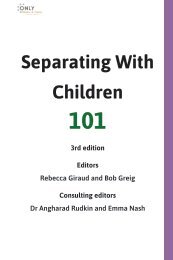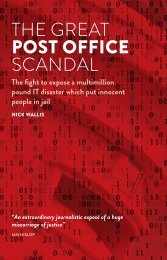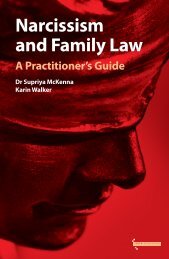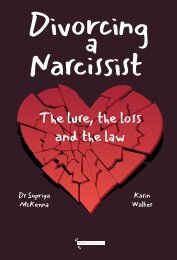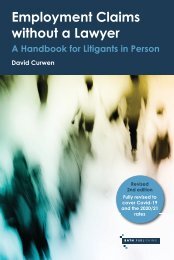The 'Secret' Family Court: Fact Or Fiction?
For approaching two decades, family courts have been accused of making life changing decisions about children and who they live with made in secret, away from the scrutiny of the public gaze. Recognising the force of these accusations, senior family courts judges have, over that time, implemented a raft of rule changes, pilot projects and judicial guidance aimed at making the family justice more accountable and transparent. But has any progress been made? Are there still suspicions that family judges make irrevocable, unaccountable decisions in private hearings? And if so, are those suspicions justified and what can be done to dispel them? In this important and timely new book, Clifford Bellamy, a recently retired family judge who has been at the sharp end of family justice during all these changes, attempts to answer those questions and more. He has spoken to leading journalists, judges and academic researchers to find out what the obstacles to open reporting are – be they legal, economic or cultural - and interweaves their insights with informed analysis on how the laws regulating family court reporting operate. Along the way he provides a comprehensive review of the raft of initiatives he has seen come and go, summarises the position now and uses this experience to suggest how this fundamental aspect of our justice system could adapt in the face of this criticism. Every professional working in the family justice system – lawyers, social workers, court staff and judges - as well as those who job it is to report on legal affairs, should read this informative, nuanced exposition of what open justice means and why it matters so much to those whose lives are upended by the family justice system.
For approaching two decades, family courts have been accused of making life changing decisions about children and who they live with made in secret, away from the scrutiny of the public gaze. Recognising the force of these accusations, senior family courts judges have, over that time, implemented a raft of rule changes, pilot projects and judicial guidance aimed at making the family justice more accountable and transparent.
But has any progress been made? Are there still suspicions that family judges make irrevocable, unaccountable decisions in private hearings? And if so, are those suspicions justified and what can be done to dispel them?
In this important and timely new book, Clifford Bellamy, a recently retired family judge who has been at the sharp end of family justice during all these changes, attempts to answer those questions and more. He has spoken to leading journalists, judges and academic researchers to find out what the obstacles to open reporting are – be they legal, economic or cultural - and interweaves their insights with informed analysis on how the laws regulating family court reporting operate. Along the way he provides a comprehensive review of the raft of initiatives he has seen come and go, summarises the position now and uses this experience to suggest how this fundamental aspect of our justice system could adapt in the face of this criticism.
Every professional working in the family justice system – lawyers, social workers, court staff and judges - as well as those who job it is to report on legal affairs, should read this informative, nuanced exposition of what open justice means and why it matters so much to those whose lives are upended by the family justice system.
You also want an ePaper? Increase the reach of your titles
YUMPU automatically turns print PDFs into web optimized ePapers that Google loves.
Published March 2020<br />
ISBN 978-1-9164315-8-4<br />
Text © Clifford Bellamy<br />
Typography © Bath Publishing<br />
All rights reserved. No part of this publication may be reproduced in any<br />
material form (including photocopying or storing it in any medium by<br />
electronic means and whether or not transiently or incidentally to some<br />
other use of this publication) without the written permission of the copyright<br />
holder except in accordance with the provisions of the Copyright,<br />
Designs and Patents Act 1988 or under the terms of a licence issued by the<br />
Copyright Licensing Agency (www.cla.co.uk). Applications for the copyright<br />
owner’s written permission to reproduce any part of this publication<br />
should be addressed to the publisher.<br />
Clifford Bellamy asserts his rights as set out in ss77 and 78 of the Copyright<br />
Designs and Patents Act 1988 to be identified as the author of this<br />
work wherever it is published commercially and whenever any adaptation<br />
of this work is published or produced including any sound recordings or<br />
films made of or based upon this work.<br />
<strong>The</strong> information presented in this work is accurate and current as at<br />
March 2020 to the best knowledge of the author. <strong>The</strong> author and the<br />
publisher, however, make no guarantee as to, and assume no responsibility<br />
for, the correctness or sufficiency of such information or recommendation.<br />
<strong>The</strong> contents of this book are not intended as legal advice and should not<br />
be treated as such.<br />
Bath Publishing Limited<br />
27 Charmouth Road<br />
Bath<br />
BA1 3LJ<br />
Tel: 01225 577810<br />
email: info@bathpublishing.co.uk<br />
www.bathpublishing.co.uk<br />
Bath Publishing is a company registered in England: 5209173<br />
Registered Office: As above




